Plot
This article needs a plot summary.(February 2024) |
| Pygmalion | |
|---|---|
| Based on | Pygmalion 1913 play by George Bernard Shaw |
| Produced by | Royston Morley |
| Starring | Margaret Lockwood Ralph Michael Arthur Wontner |
Production company | BBC |
Release date | 8 February 1948 |
Running time | 150 mins |
| Country | United Kingdom |
| Language | English |
Pygmalion is a 1948 British TV production of the 1913 play by George Bernard Shaw. It was the first time the play was done for television and was the longest production done by the BBC to that time. [1]
It starred Margaret Lockwood who was under suspension by the Rank Organisation at the time for refusing a film role. [2] [3]
This article needs a plot summary.(February 2024) |
The production was very well received. [4] It was voted best TV production of the year and Lockwood voted Best Actress. [5]
It was Lockwood's first play on TV and she wrote in her memoirs that "I loved every moment of Pygmalion. After the performance I was like a beginner again waiting nervously for the papers, bracing myself to read the criticism. I had not felt this way about notices since I first went on the stage. Thank goodness they were good ones. I was generously praised." [6]
Lockwood later toured with the play on stage. [7]
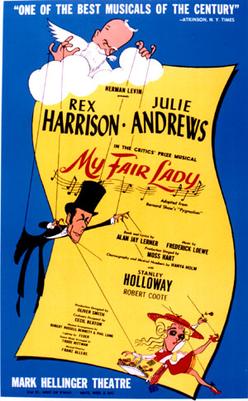
My Fair Lady is a musical with a book and lyrics by Alan Jay Lerner and music by Frederick Loewe. The story, based on the 1938 film adaptation of George Bernard Shaw's 1913 play Pygmalion, concerns Eliza Doolittle, a Cockney flower girl who takes speech lessons from professor Henry Higgins, a phonetician, so that she may pass as a lady. Despite his cynical nature and difficulty understanding women, Higgins grows attached to her.
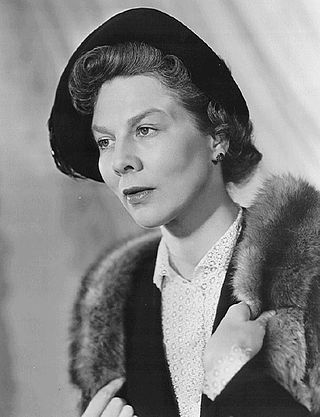
Dame Wendy Margaret Hiller, was an English film and stage actress who enjoyed a varied acting career that spanned nearly 60 years. Writer Joel Hirschorn, in his 1984 compilation Rating the Movie Stars, described her as "a no-nonsense actress who literally took command of the screen whenever she appeared on film". Despite many notable film performances, Hiller chose to remain primarily a stage actress.

Margaret Mary Day Lockwood, CBE, was an English actress. One of Britain's most popular film stars of the 1930s and 1940s, her film appearances included The Lady Vanishes (1938), Night Train to Munich (1940), The Man in Grey (1943), and The Wicked Lady (1945). She was nominated for the BAFTA Award for Best British Actress for the 1955 film Cast a Dark Shadow. She also starred in the television series Justice (1971–74).
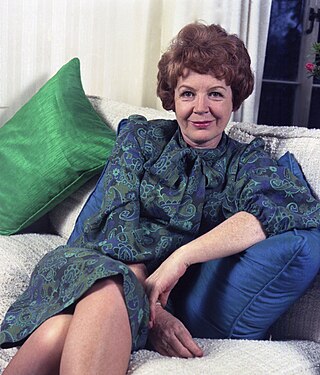
Phyllis Hannah Murray-Hill, known professionally as Phyllis Calvert, was an English film, stage and television actress. She was one of the leading stars of the Gainsborough melodramas of the 1940s such as The Man in Grey (1943) and was one of the most popular movie stars in Britain in the 1940s. She continued her acting career for another 50 years.
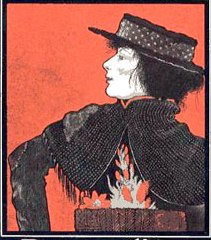
Pygmalion is a play by Irish playwright George Bernard Shaw, named after the Greek mythological figure. It premièred at the Hofburg Theatre in Vienna on 16 October 1913 and was first presented on stage in German. Its English-language première took place at His Majesty's Theatre in London's West End in April 1914 and starred Herbert Beerbohm Tree as phonetics professor Henry Higgins and Mrs Patrick Campbell as Cockney flower-girl Eliza Doolittle.

Pygmalion is a 1938 British film based on the 1913 George Bernard Shaw play of the same name, and adapted by him for the screen. It stars Leslie Howard as Professor Henry Higgins and Wendy Hiller as Eliza Doolittle.
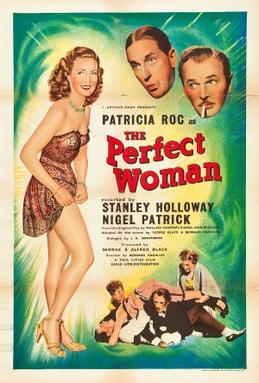
The Perfect Woman is a 1949 British farce comedy film directed by Bernard Knowles and written by George Black, Jr and J. B. Boothroyd, based upon a play by Wallace Geoffrey and Basil Mitchell. The screenplay concerns a scientist who creates a robotic woman in his lab.

Marie Lohr was an Australian-born actress, active on stage and in film in Britain. During a career of more than 60 years she created roles in plays by, among others, Bernard Shaw, J. M. Barrie, Frederick Lonsdale, Somerset Maugham, William Douglas-Home and Noël Coward. She appeared mainly in the West End, but toured the British provinces at intervals throughout her career, appeared in Broadway productions and toured Canada.

The White Unicorn is a 1947 British drama film directed by Bernard Knowles and starring Margaret Lockwood, Joan Greenwood, Ian Hunter and Dennis Price. Kyra Vayne appeared as the singer. It was made at Walton Studios by the independent producer John Corfield, and released by General Film Distributors. The film's sets were designed by Norman G. Arnold. It was also known as Milkwhite Unicorn and Bad Sister.

The Magic Bow is a 1946 British musical film based on the life and loves of the Italian violinist and composer Niccolò Paganini. It was directed by Bernard Knowles. The film was entered into the 1946 Cannes Film Festival.

Barry K. Barnes was an English film and stage actor. The son of Horatio Nelson Barnes and Anne Mackintosh Barnes, he was born and died in London. He appeared in sixteen films between 1936 and 1947. He played Sir Percy Blakeney in the 1937 film The Return of the Scarlet Pimpernel. His film career was cut short in 1947 due to an undiagnosable illness contracted during the war. He was married to actress Diana Churchill, and worked with his wife on stage during the 1940s and 1950s, taking West End revivals of The Admirable Crichton and On Approval on profitable tours.
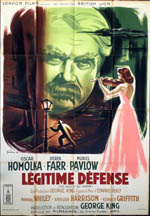
Code of Scotland Yard is a 1947 British crime film directed by George King and starring Oskar Homolka, Muriel Pavlow and Derek Farr. It was originally released as The Shop at Sly Corner, being based on the popular stage play of that title by Edward Percy.

Madness of the Heart is a 1949 British drama film directed by Charles Bennett, produced by Richard Wainwright for Two Cities Films and starring Margaret Lockwood, Maxwell Reed, Kathleen Byron and Paul Dupuis. The screenplay was written by Charles Bennett, adapted from the novel of the same name by Flora Sandström.

Cardboard Cavalier is a 1948 British historical comedy film directed by Walter Forde and starring Sid Field, Margaret Lockwood and Jerry Desmonde.

Look Before You Love is a 1948 British drama film directed by Harold Huth and starring Margaret Lockwood, Griffith Jones and Maurice Denham.

Eliza Doolittle is a fictional character and the protagonist in George Bernard Shaw's play Pygmalion (1913) and its 1956 musical adaptation, My Fair Lady.

Pygmalion is a 1935 German comedy film directed by Erich Engel and starring Jenny Jugo, Gustaf Gründgens and Anton Edthofer. It is based on George Bernard Shaw's 1913 play Pygmalion.
A Rose without a Thorn is a 1958 Australian television play about King Henry VIII's marriage to Catherine Howard. It was directed by Alan Burke from a play by Clifford Bax. The play was shown live in Sydney, recorded, then shown in Melbourne.
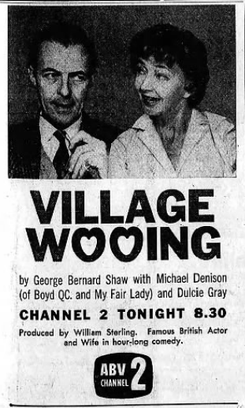
Village Wooing is a 1962 Australian television play directed by William Sterling and starring Michael Denison and Dulcie Gray who were touring Australia at the time. It was based on the play by George Bernard Shaw.
Ann Veronica is a 1952 British TV version of the 1909 H. G. Wells novel of the same name.